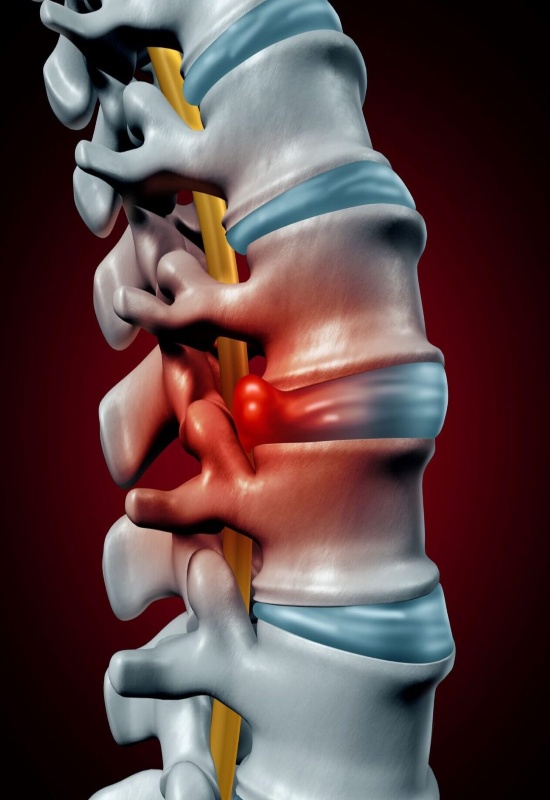Herniated Disc Treatment in the Greater Maryland Area

Professional & Reliable Herniated Disc Treatment
When you have a herniated disc, you might have trouble sitting, standing, or walking. When your herniated disc symptoms prevent you from participating in your normal daily activities, it's time to consult a professional. At Greater Maryland Pain Management, we specialize in diagnosing and treating herniated discs in Odenton, Crofton, Annapolis, Edgewater, Prince Fredrick, Leonardtown, Catonsville, and the greater Maryland area. Our team has decades of experience in identifying herniated disc symptoms, finding the underlying cause of back pain, and developing a customized herniated disc treatment plan specific to each client.
Understanding What a Herniated Disc Is
If you’ve been Googling “What is a herniated disc?" because you aren't sure if you're exhibiting herniated disc symptoms, keep reading. A herniated disc is a condition in which one of the soft, rubbery discs between your spinal vertebrae becomes injured. Each spinal disc has a rubbery exterior that protects a softer center, or nucleus, that has a jelly consistency. When a disc is injured, that soft interior might get pushed out of the exterior through a tear or break. This can occur anywhere in your spine but is most common in the lower back or lumbar spine.
Herniated Disc Pain Vs. Back Pain
Chronic or recurrent back pain can be incredibly uncomfortable and affect every aspect of your life. But herniated disc symptoms are more complex than just back or neck pain. Standard lower back pain will feel the same across the lower back and might affect the middle or upper back as well. However, if you do have referred pain as part of your low back pain symptoms, the pain will not radiate down either of your legs or affect your feet. Typical back pain also doesn't affect your balance and won’t cause a tingling or numb feeling.

Recognize Herniated Disc Symptoms
Some people don't show any herniated disc symptoms, while others have symptoms that get worse and worse over time. Whether your herniated disc symptoms have come on suddenly, worsen with activity, or are always present no matter how you try to find relief, you need a specialist to make a diagnosis. Some herniated disc symptoms include:
- Arm Pain or Leg Pain – A herniated disc in the neck will cause arm pain that shoots down just one arm towards the hand. A herniated disc in the back will cause leg pain that shoots down just one leg to the foot. You might also experience shooting, burning, or sharp pain in the shoulder, upper arm, forearm, buttock, thigh, and calf pain that worsens when you cough, sneeze, or move.
- Tingling, Numbness, or “Pins and Needles” Feeling – Another common herniated disc symptom is a tingling or “pins and needles” feeling in your hip, thigh, foot, or arm. You might also feel like your arm or leg is numb or “dead” feeling.
- Back or Neck Pain – If your herniated disc is in your lumbar spine, you’ll experience lower back pain that might worsen with movement. If your herniated disc is in your cervical spine, you might develop neck pain that makes it hard to move your head.
- Muscle Weakness – The nerve affected by your herniated disc might be compressed, which can cause you to experience muscle weakness in your arm, hand, leg, or foot. This might make walking, standing, picking up and carrying things, and completing simple tasks hard.
How We Diagnose a Herniated Disc
Our team works hard to get to the bottom of the root cause of our patients' symptoms so that we can offer them herniated disc pain relief. We might run the following diagnostic or imaging tests to diagnose your herniated disc pain:
- Physical Tests – One of our team members will likely have you perform simple physical tasks so that they can evaluate your gait, balance, posture, and dexterity. This will help us determine if you're showing herniated disc symptoms or symptoms of another spinal condition.
- X-Rays – If we think you might have another health condition causing your symptoms, we might order X-rays to look for signs of a fracture, bone spur, disc degeneration, or problems with spinal alignment.
- MRI – An MRI uses radio waves and a magnetic field to create high-contrast pictures of the inside of the body. Before an MRI, you will be injected with a gadolinium-based dye that enhances the image quality and allows us to see elements of your spine and vertebrae better. We can then locate the cause of your back pain, the location of a herniated disc, and which nerves are affected.
- CT Scan – A CT scan takes a series of X-rays from different vantage points so that we can combine them to create a cross-section of your spine. We'll then evaluate it for signs of injury, herniated discs, disc or nerve compression, or other problems.
- Myelogram – This is a type of dye injected into your spinal fluid before a CT scan. Much like an MRI with contrast, a myelogram allows us to see high-contrast images in great detail to see damage to or pressure on the vertebrae, nerve roots, and herniated discs.
Explore Our Herniated Disc Treatment Options
Once we diagnose a herniated disc, we'll review all your options for herniated disc treatment. We will consider your symptoms, how they affect your life, your daily lifestyle, your overall needs and health, and your goals. We may combine one or more herniated disc treatment methods:
- Interventional Procedures – We offer non-invasive herniated disc treatment with reduced downtime and minimal recovery periods.
- Medication Management – We can find the right combination of pain medication, diet, nutritional changes, supplements, holistic remedies, and drug therapies to create a comprehensive herniated disc treatment plan.
- Nerve Block Treatments – If your herniated disc symptoms include nerve pain or shooting pain in the arms and legs, we may recommend nerve block treatments. This treatment method only takes 15 minutes and can offer significant pain relief without surgical intervention.
Contact Us for Herniated Disc Pain Relief
If you’re ready to seek herniated disc pain relief in the greater Maryland area, call us at Greater Maryland Pain Management. Our board-certified physicians work closely with each patient to evaluate their herniated disc symptoms and determine how their lives are affected. We create a herniated disc treatment plan for your needs, goals, symptoms, and lifestyle. To learn more about our treatment of herniated discs in Odenton, Crofton, Annapolis, Edgewater, Prince Fredrick, Leonardtown, or Catonsville, MD, call us or request an appointment online through our website.